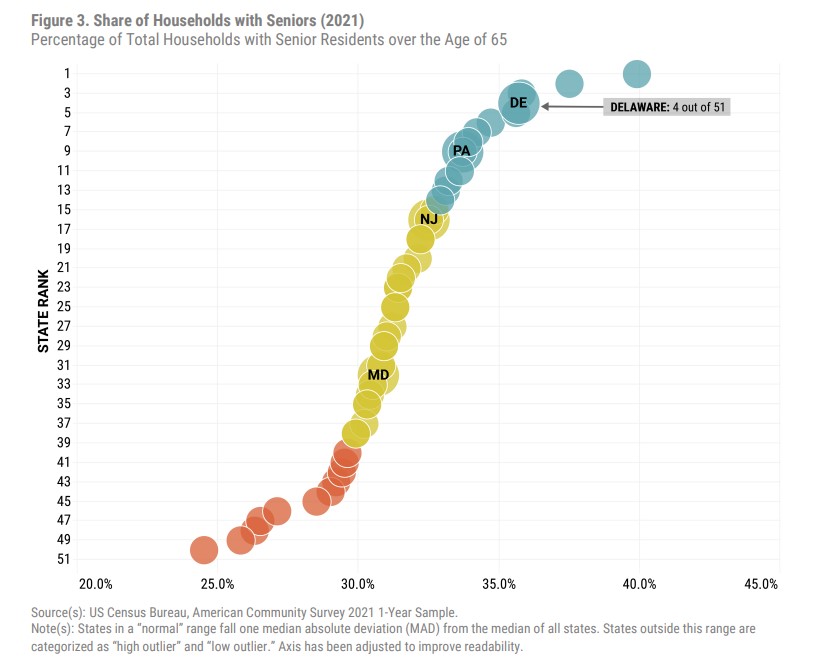That’s the message you would get if you boiled down the Delaware Business Roundtable’s newly released Delaware Investment Agenda.
Formed in 1981, the Delaware Business Roundtable is a volunteer consortium of Delaware CEOs and presidents that promotes select public policy issues impacting quality of life such as public education, job creation and, in recent years, entrepreneurship.
In 2016, the roundtable released the Delaware Growth Agenda, which found that many of the industries that had been pillars for job growth in the state, like auto manufacturing and chemicals, were no longer job creators. It recommended building an entrepreneurship and innovation ecosystem over the next decade — advice that affected how the state invests in economic development, including replacing the Development Office with the Delaware Prosperity Partnership (DPP).
The roundtable comprises CEOs of banks, healthcare systems and centers, utilities, law firms, construction companies and nonprofits. The president of every college and university in Delaware is a member, as are CEOs of Delaware businesses in the innovation ecosystem, including Mac MacLeod of Carvertise, Herve Hoppenot of Incyte and William Provine of The Innovation Space.
The Delaware Investment Agenda is a follow-up to the Growth Agenda. This time, instead of proposing ways to sustain the state economy following auto plant closures and the Dow-DuPont merger (later dissolved in 2019), the focus is on maintaining the momentum the state built over the last eight years.
A decade of successes and challenges
The roundtable found that, since the Growth Agenda that the governor and state legislature widely embraced, Delaware has experienced significant economic growth. Gross domestic product (GDP) increased from $69.6 billion in 2017 to $75.2 billion in 2022, an 8% growth rate.
The state’s “traditional” industries, including finance, agriculture, healthcare and chemical manufacturing, retained their strength. New sectors like biopharmaceutical manufacturing, clean energy production and fintech simultaneously emerged. Nearly 16,000 non-farm jobs were created.
There are, however, challenges in the findings, particularly when it comes to the low labor force participation rate — something we noted when covering Delaware’s placement on EIG’s Index of State Dynamism in January. The roundtable attributed this figure to a high rate of senior population: People over 65 make up 20% of Delaware’s population, including a growing number of people who relocated to the state for retirement. The state consistently ranks as a top retirement destination by companies like Bankrate, which ranked it #2 in 2023 while touting our quality healthcare, relatively low tax burden and diversity.

That trend is both good and bad; new residents contribute to the economy, but when they don’t work in large numbers, it can make it more difficult for employers to find talent. The report also notes that the five states with the lowest labor force participation rates — and Delaware is low, ranking in the bottom 10 — have the lowest median household incomes in the country, a trend Delaware does not want to follow.
Childcare also adds to the challenges for employers. 13% of Delaware children had a family member who quit or didn’t take a job due to difficulty finding childcare, according to the Baltimore-based Annie E. Casey Foundation. That comes out to $415 million in lost earnings, productivity and tax revenue a year.
So what now?
Robert Perkins, executive director of the Delaware Business Roundtable and president of the consulting firm Brandywine Public Strategies, said that Delaware needs to build on the success of the DPP.
“[The DPP] is a core example of a unifying, invigorating economic development effort,” Perkins said in an announcement. “With funding from both the public and private sectors, the DPP has become one of the nation’s most respected economic development organizations and has a successful record of retaining and attracting jobs and investment in the state.”
The Investment Agenda also recommends a commitment to entrepreneurship and innovation, proposing a new statewide science and technology strategy to help foster the state’s entrepreneurial infrastructure. It also advocates:
- Increased outreach by the Division of Small Business
- More robust storytelling about successes
- New incentives to attract more investors and entrepreneurs
- More opportunities at Delaware universities
For the workforce, the roundtable recommends establishing a task force to help ensure development programs train Delawareans for high-demand jobs with a talent shortage. It additionally suggests investments in early childhood education, workforce housing and increased support for returning citizens.
For long-term competitiveness, the group proposes establishing a nonpartisan, independent Delaware Futures Council to advise state leaders on potential challenges ahead.
“The decisions we make collectively in the coming months and years,” said Delaware Business Roundtable chair and EDiS Company CEO Brian DiSabatino, “will determine whether and how Delaware continues to set a course for excellence and prosperity or if we begin to backslide.”
Disclosure: This article mentions the Delaware Prosperity Partnership, a Technical.ly client. That relationship has no impact on this report.







